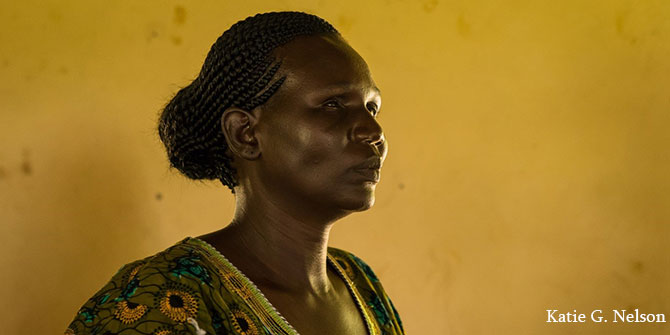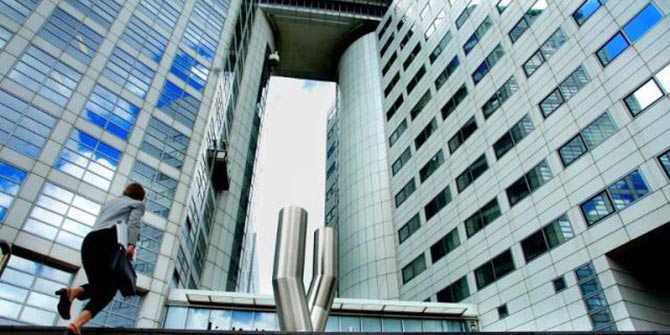Eritrea’s brutal dictatorship has created a society with the hallmarks of one at war. Now with signs that President Isaias Afwerki has become increasingly isolated, talk has begun of a new regime. But with mistrust so high of public institutions, writes Bahlbi Malk, a recovery programme must reform more than its failing institutions and undertaken psychological reconstruction.
In the early 1990s, Eritrea was praised as a model for post-conflict governance. It attempted to formulate and implement socio-economic development policies and institutional reconstruction strategies with relatively good governance, judicial justice, political transparency, accountability, fundamental freedoms and participation of citizens in public affairs.
Following the devastating border war with Ethiopia (1998–2000), the country tragically degenerated from ‘the one ray of hope in the Horn of Africa’ into a totalitarian state where economic development and post-war reconstruction were brought to a standstill, and citizens were stripped of all fundamental rights and freedoms. The President of Eritrea, Isaias Afwerki, rose to prominence in the struggle for independence, achieved from Ethiopia in 1991, where he moved ‘from heroic liberator to iron-fisted saboteur’ of that independence. Socio-political repression, economic deprivation and structural violence subsequently became part of Eritrea’s daily life.
Over the last 27 years, Eritrea had borne the brunt of war and brutal dictatorship, each with equally disastrous socio-economic, political and psychological ramifications. Although the country has not been in a full-blown war since the Ethio-Eritrean border war, it exhibits a society at war’s main characteristics, which include forced migration, drastic loss of labour force, social upheavals, economic dislocation, social trauma, disruption of social networks, the decline of education and disintegration of communities and institutions.
For 18 years, the border stalemate with Ethiopia has been used as a pretext to suspend the constitution, limit all rights and freedoms, extend its national service indefinitely, postpone elections indeterminately and imprison citizens without due process of the law.
In short, the ‘no war, no peace’ situation with Ethiopia was used as a justification to hold the country hostage and to tighten Isaias’s totalitarian grip on the population.
However, Eritreans have more reasons to be optimistic about the return to peace, development, stability and normalcy. Ethiopia’s unconditional acceptance and promise of full compliance with the Algiers Agreement in July 2018 (signed following the border war by both states in 2000) has not only paved the way for peace between the two countries but also removed the major false pretext.
The Ethio-Eritrea peace rapprochement has, consequently, triggered serious and widespread questions and demands within the public, the army and the ruling regime. As the president has failed and is unwilling to respond to staggering political public demands, including the demobilisation of national service personnel and the implementation of the 1997 constitution, he has lost the legitimacy to govern and the cooperation of the masses to obey his rules. This has removed the psychological component of terror that had initially drove the population into submission, and the Eritrean public is coalescing around the common desire to abolish dictatorship.
With the growing mass movement in the diaspora, silent public disobedience in Eritrea and signs of a looming military coup, it is not premature to talk about post-Isaias Eritrea. Indeed the 27-year hold on power is visibly coming to an end.
Isaias is currently facing a political bottleneck with no room to manipulate and manoeuvre his way out. He now lives in a secluded, inaccessible and hidden from public village in Adi Halo, outside the capital city. He has become an isolated and lonely leader with depleted and crumbling political capital who is decreasingly likely to regain control. His grip on power slipping away at a fast pace, Eritreans will inevitably have a crucial window of opportunity to transition the country from war and dictatorship to peace and democratisation.
Post-dictatorship reconstruction and recovery
Post-war recovery is a complex process, but recovery for a war-torn society tarnished by dictatorship adds an extra dimension of complexity. Bilateral donors, multinational agencies and international financial institutions should therefore treat Eritrea as a country emerging from war, providing emergency and post-war recovery assistance, trust funds, post-war recovery grants and other financial support. Be that as it may, the existing administrative structures and government systems are not designed to outlive Isaias, and there is no succession plan.
With no vice-president or even constitution in place to secure a safe transition of power, the military becomes the only force to assume control of the government, and the only available option to safeguard the nation through a turbulent transition process to democracy; Eritrea has no civil society and lacks underground opposition except for a new force affiliated with the army. Engaging and negotiating with an interim military government therefore appears the sole practical mechanism that might lead to fair and free democratic elections, and transition the country to sustainable, stable and permanent civilian rule.
The international community, however, tends to consider military coups as working against democratic ideals. But when the army responds to popular opposition against an authoritarian regime, there is potential for more democracy-promoting attributes than those coups perpetrated by power-hungry military leaders to depose a legitimately elected democratic leader. The international community should therefore seize this window of opportunity to support the transitional caretaker government.
Although the political decisions for recovery and institutional engineering should be an internally-driven process, the international community would still be required to play an important role in supporting the transitional government. The post-dictatorship situation, potentially chaotic and turbulent, demands their involvement in establishing security, rule of law, rebuilding institutional capacity, meeting basic humanitarian and emergency needs and creating conditions for democratic elections to usher a new permanent government that guarantees long-term political stability.
Democracy will be a prerequisite for political, economic, legal, cultural and societal reconstruction. But establishing functional institutions, civil society, free press and a viable educational system are prerequisites for a successful democracy. This is because the dictatorial government has created a socio-economically and psychologically shattered and politically disenfranchised society. The restoration of the education system, civil liberty and free press, among others, become extremely important to properly inform citizens to create the conditions for justice, trust, cooperation, participation and peaceful coexistence.
As the over-centralisation of government has given birth to dictatorship in Eritrea, decentralisation becomes a key policy priority. Over-centralisation is a political system in Eritrea which has nurtured a political culture of blind obedience to authority. It should be countered by bottom-up governance and a decentralisation process in which democratic values and a culture of political participation can be imbedded. Through this access to justice, participation in public affairs, personal security and freedom of expression, movement, worship, association and assembly can be secured.
Political recovery is not only about restoring democratic institutions, holding a free election and drafting or implementing a constitution. It is about uncovering the truth, righting wrongs and recovering citizens’ voices with a renewed spirit to overcome past uncertainties. It is an effort to transform the society from a political environment of fear and insecurity into a vision of hope and cooperation where ordinary citizens are made to feel safe in their own country. Such changes will enable citizens to begin trusting each other and reconciling with their troubled past.
Unlike inter-state war which often mobilises national unity, and where the adversaries are often specific, dictatorship instills hostility, insecurity and mistrust within a society. Pitting religious or ethnic groups against each other leaves deep and complicated psychological, social, political and legal wounds that make a transition to democratisation and reconciliation incredibly difficult. These conditions suggest that the recovery process requires a multidimensional and country-specific approach which involves dual strategies tailored for post-war and post-dictatorship reconstruction. These should consider the interlinked and interdependent nature of the elements of post-war and post-dictatorial state reconstruction which need to be addressed comprehensively, concurrently and with the same urgency.
The war and decades of oppression have devastated the social, psychological, political, economic and institutional aspects and human capital of Eritrean society. It has left behind fear and mistrust of public institutions, entirely broken communities, depleted human capital and severely damaged institutions and infrastructures.
Addressing post-war and post-oppression recovery challenges will, therefore, require well-synchronised relief and development initiatives as well as comprehensive, extended and concurrent efforts of enhancing community resilience, restoring families, rebuilding human resource capacity, reconnecting community networks and reconstructing infrastructures.
Because a great portion of Eritrea’s human resources have been held in national service, or fled Eritrea to escape it, there are a number of policies that must be immediately implemented. These include the indefinite national service’s suspension, demobilisation of those who have been in service, provision of reintegration training and employment for the demobilised personnel as well as repatriation of the country’s displaced populations.
Only once these have been implemented can the country begin to revive a normalcy. From there, Eritrea can pursue effective state-building, peacebuilding, governance, development, stability and security by confronting its far-reaching institutional constraints.
Bahlbi Malk is a researcher and development practitioner working in post-war recovery programs with the Canadian Partnership for Reconstruction and Development. He can be followed on Twitter @bahlbiyemane
Photo: Eritrea’s Independence Day, 24 May 1991. Credit: Eritrean Center for Strategic Studies (public domain).
The views expressed in this post are those of the author and in no way reflect those of the Africa at LSE blog, the Firoz Lalji Centre for Africa or the London School of Economics and Political Science.






Eritrea will be librated from the harsh autocrat inhuman regime very soon in the new future by heroin children like you.
Thanks to God.
Eritrea since 1945 is been treated and a country that’s not excepted
In the world due to that Eritreans invanted there own way to deferant there rights etc…
Eritreans believes that was the only way to survive on that era I mean from 1961-1991.
But after 1998 and the not ethical wore that been accouerd on that time made a reaction
Due to survive again but that way had its on deferent concequncess to the life of the civil hood society.
After 2018 and the historical pace agreement Eritreans way of thinking has entered on new stage in order to cube the changes to enhance there life I believe that the rigem in Eritrea understands that but the should work hard to match the people needs and the sustainable development for the people
Sure the country should focus on peace and stability to give room for human resource that fled to come back and develop the great nation.